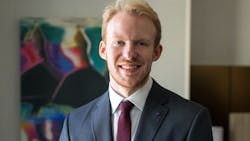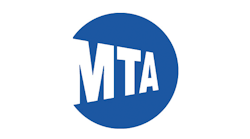- One word to describe yourself: Inquisitive
- Alma Mater: Swarthmore College and Northwestern University
- Fun fact about yourself: I am half Danish and most of my family lives in Denmark and Norway.
- Favorite station or stop that you have ever visited: My favorite station is Københavns Hovedbanegård (Copenhagen Central Station). With most of my family and several close friends living in and near Copenhagen, traveling through the station always made me happy since it meant I was going to see them.
- Favorite route you have ever ridden or frequent: My favorite route is the 1 line in New York City. Despite almost all of the stations on the line opening between 1904 and 1918, it still runs frequently and reliably 24 hours per day.
After starting five years ago as a staff analyst trainee I, Erik Jensen now manages the reporting analytics group in strategic initiatives at NYCT. Throughout his career, Jensen has exhibited a passion for working with data to help improve mobility in New York City, and his data expertise and insights have shaped improvements throughout the system.
After joining the systems data and research group at NYCT in 2016, Jensen analyzed electricity data from the substations that power the subway's third rail. Through regression analyses incorporating train movement and weather data, he identified that by reducing the air conditioning setting on trains running on the 7 Line by three degrees in the summer, it would be possible to save the equivalent of 300 homes' worth of electricity per day. After a brief pilot, the change in the air conditioning settings went into effect on trains running on multiple elevated lines, with no increase in the number of customer complaints about hot train cars. Following the electricity project, Jensen developed a new bus speed metric based on processed AVL data and led a deep dive into bus speed data to identify the slowest sections of bus routes throughout the system. He also used processed AFC data from buses to develop a list of the longest and slowest trips that riders typically take. The output of these analyses informed much of NYCDOT's Bus Forward plan in 2017, which laid out plans for extensive street improvements along poor performing corridors.
As part of a root cause analysis task force established in 2017 to identify the root causes of delays impacting subway trains, Erik developed a procedure to store and process maintenance logs. Using this processed data, Erik developed heatmaps of incident failures across the system, identifying geographic areas with recurring failures so maintenance teams could go and replace components before they failed.
For the past two years, Jensen's primary responsibility has been to manage the team that oversees the data pipelines that feed most of NYCT's daily, weekly and monthly operations performance reporting. He has effectively managed these data streams, improving next-day reliability and automating many of the previously manual steps to free up his staff. He has ensured that daily, weekly and monthly reports continue to go out so that stakeholders throughout the organization do not face barriers to their work.
Shortly after the start of the COVID-19 pandemic, Jensen developed a sampling methodology to estimate mask usage throughout the bus and the subway system. He was instrumental in ensuring multiple teams from different departments worked together to process the data that traffic checkers collected, and report it correctly without compromising the randomness of the sample. The final results of the sample showed that almost all customers were wearing masks, which informed policy decisions and strategies to focus on the distribution of free masks alongside enforcement efforts. He also worked with the website team to put automatic updates on the website weekly, giving journalists and riders transparent information about mask usage in the system.
In addition, Jensen previously led the Speed and Capacity Task Force. The task force focused on fixing issues that slow trains throughout the system and has raised more than 20 speed limits, cleared up confusing signage in multiple locations and fixed many slow clearing signals.
Outside of the office, Jensen is a member of the NYC chapter of Young Professionals in Transportation, and served on the board for two years as the content manager, developing a new website for YPT-NYC and recording meeting minutes/following up on action items.
Is there a specific experience that led you to where you are today?
Both of my parents worked in transportation, so I had definitely thought about the field before. However, it was a research project during my study abroad in Cape Town, South Africa that really convinced me I wanted to work in transportation. While I was there, a professor at the University of Cape Town gave me the opportunity to work on a research project looking at how land use affected illegal pedestrian crossings on the highways around Cape Town, and how effective government interventions had been at mitigating the crossing and preventing crashes. Despite being in another country, it reframed my perspective on how we often fail to provide ways for people to move around cities without a car in the U.S. too.
What do you enjoy most about your job?
Riding the subway to work in the morning and knowing that I'm a part of making sure that people are able to move around the city. Even on the frustrating days, I get to work with from some absolutely amazing people, all with the knowledge that we're working to ensure people can get around the city to get access to jobs, healthcare, friends, and family.
On a more selfish note, the tours of behind-the-scenes infrastructure like Bus Depots and the Rail Control Center are also pretty fun.
What’s the most challenging part of your job?
Explaining to stakeholders, planners, and operations staff who don't have a background in modeling or programming what types of analyses we can do and what the limitations are. While processing all of the data we have access to and analyzing it is difficult, none of it matters if we can't effectively communicate to others what changes they should make and why.
Accomplishment you’re most proud of and why?
I'm most proud of the work I've done to help build data pipelines to transform and present bus performance data to planners and operations staff so they can keep improving service in the short and long term. I'm just one of the many people on my team who keep our daily data pipelines running smoothly, but in my time at NYCT I've gotten to contribute to analyses for busway proposals, network redesigns, all door boarding, and even congestion pricing.
Best advice/tip/best practice to share from your area of expertise?
Never stop learning! This doesn't just mean keeping up with the latest technology trends, but if you have an admin background it also means getting out in the field and talking with operations staff at every opportunity you have. Understanding the intricacies of the system you work in can help you identify new projects and evaluate whether proposals from others are worth pursuing.




